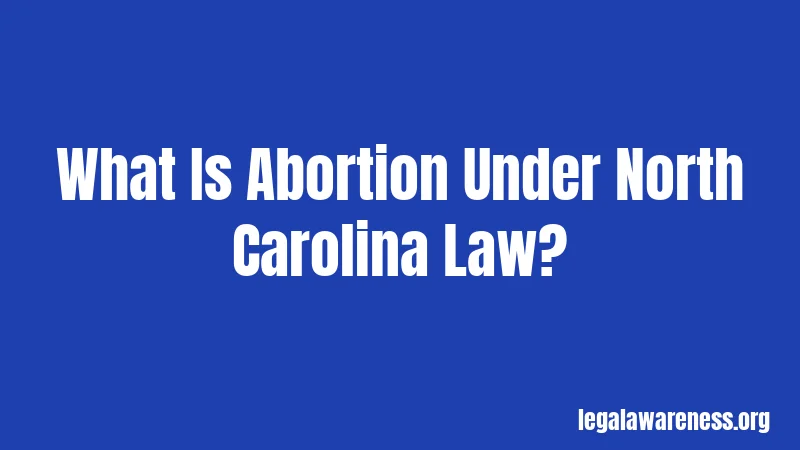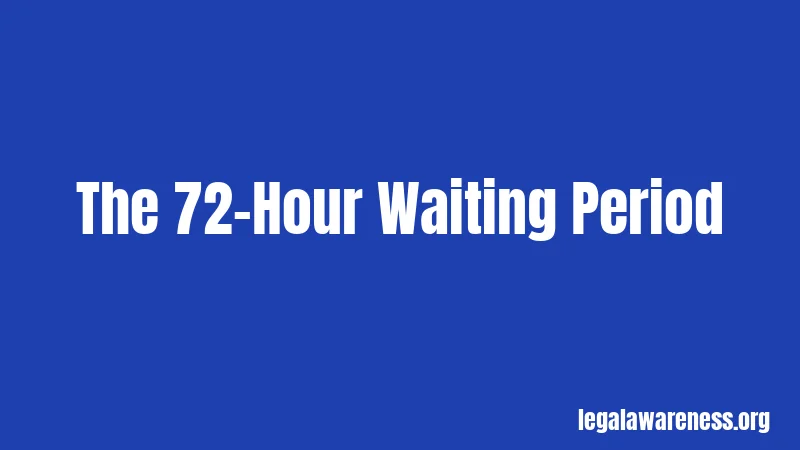Abortion Laws in North Carolina (2026): Your Complete Legal Guide
Most people don’t realize how much has changed. Seriously. Abortion laws in North Carolina have shifted dramatically in recent years, and the rules can be confusing.
Here’s the deal. If you live in North Carolina or need abortion care in the state, you need to know exactly what’s allowed. This guide breaks down everything in simple terms. No legal jargon. Just the facts.
What Is Abortion Under North Carolina Law?

Let’s start with the basics. Under North Carolina law, abortion is a procedure that ends a pregnancy. The state defines it pretty specifically.
An abortion includes using medicine, drugs, or any medical instrument to end a pregnancy. But here’s something important: treating an ectopic pregnancy or removing a fetus that has already died does not count as abortion under the law.
Wondering why that matters? Because those procedures remain legal at any point in pregnancy. No restrictions.
When Is Abortion Legal in North Carolina?
Okay, pause. Read this part carefully.
Abortion is currently legal in North Carolina up to 12 weeks of pregnancy. After that, the rules get stricter. But there are exceptions.
Here’s how it breaks down:
Through 12 weeks: Abortion is legal for almost any reason. The procedure must be performed by a licensed physician in a hospital or certified clinic.
Through 20 weeks: Abortion is allowed if the pregnancy resulted from rape or incest. You don’t have to report the crime to police first.
Through 24 weeks: Abortion is permitted if a doctor diagnoses a “life-limiting” fetal anomaly. This means a condition that would likely cause death shortly before or after birth.
At any point: Abortion is legal if continuing the pregnancy threatens the pregnant person’s life or could cause serious physical harm.
Pretty straightforward, right? But wait, there’s more to know.
The 72-Hour Waiting Period

I looked this up recently. The waiting period surprised me. It might surprise you too.
North Carolina requires one of the longest waiting periods in the country. Here’s how it works.
You must receive state-mandated counseling at least 72 hours before your abortion. That’s three full days. The counseling appointment must be in person.
During this appointment, a provider will give you specific information. This includes medical risks of abortion, risks of carrying a pregnancy to term, and information about adoption services.
Then you wait. For 72 hours. Then you can have the procedure.
This means you’ll need at least two separate trips to the clinic. For people traveling long distances, this creates real challenges. Many patients need to find a place to stay during those three days.
Sound complicated? It’s actually harder for many people than you’d think. Some clinics have discounted hotel rates available for patients who need them.
The Abortion Pill in North Carolina
Here’s where things get interesting. The abortion pill has its own set of rules in North Carolina.
The abortion pill is actually two medications: mifepristone and misoprostol. Together, they end a pregnancy up to 10 weeks. The FDA approved this combination years ago.
In many states, you can get these pills through telehealth and have them mailed to your home. Not in North Carolina. The state has stricter rules.
What North Carolina requires: A physician must dispense the medication in person. You still need to complete the 72-hour waiting period first. That means at least two in-person visits.
What changed recently: A federal judge struck down some restrictions in 2024. Now nurse practitioners, midwives, and physician assistants can prescribe medication abortion. Patients can also receive the pills by mail after their initial in-person consultation. The mandatory follow-up visit was also struck down.
Honestly, the rules are still being fought over in court. Some requirements remain blocked while legal challenges continue. Your best bet is to call a clinic directly for the most current information.
Rules for Minors

You’re not alone if this confuses you. Many people don’t understand how abortion works for people under 18 in North Carolina.
North Carolina requires parental consent for minors seeking abortion. But there are options.
Parental consent: You need written permission from one of the following people: a parent who has custody of you, your legal guardian, a parent you live with, or a grandparent you’ve lived with for at least six months.
Only one person from this list needs to give consent. Not both parents.
What if you can’t ask a parent? There’s a process called judicial bypass. This lets you ask a judge for permission instead.
The judicial bypass is confidential. No reporters. No jury. Usually just you, a lawyer, and the judge. The court will provide a free lawyer if you want one.
During the hearing, the judge will ask if you understand the abortion procedure and have thought about your decision carefully. They’ll also check that no one is forcing you to have an abortion.
If the judge approves, you’ll get a signed document to take to your abortion appointment. If denied, you can appeal within 24 hours.
Need help with judicial bypass? The Repro Legal Helpline offers free, confidential support at 844-868-2812.
Penalties for Breaking These Laws
Now, here’s where things get serious. Breaking North Carolina’s abortion laws carries real consequences.
The penalties target doctors and medical providers, not patients. This is an important distinction.
For physicians who violate the 12-week ban: Performing an illegal abortion is a Class H felony. This carries up to 25 months in prison. Doctors can also lose their medical license.
For violations of the 20-week limit: This is also a Class H felony. The same penalties apply.
For other violations: Some infractions are treated as misdemeanors. Others can result in fines up to $5,000.
What about patients? North Carolina law does not criminalize patients who receive abortions. There is no explicit crime of “self-managed abortion” in the state code.
Less severe than some states, but still serious for providers. This is one reason some doctors have left states with strict abortion laws.
How Much Does Abortion Cost?
Let’s talk about the money side. Most people don’t realize how expensive abortion can be.
Medication abortion: Typically costs $500 to $950 without insurance. Prices vary by clinic.
Surgical abortion (first trimester): Usually runs $340 to $600. Again, prices depend on the provider.
Second trimester procedures: Costs increase significantly. Can range from $800 to several thousand dollars depending on how far along the pregnancy is.
Here’s the tricky part about insurance.
North Carolina’s Medicaid program does not cover abortion. The only exceptions are rape, incest, or life endangerment. This follows the federal Hyde Amendment.
Private insurance has limits too. Plans purchased on the state health insurance marketplace cannot cover abortion except for rape, incest, or life endangerment. State employee health plans have the same restrictions.
If you have private insurance through your employer, call the number on your card. Some plans do cover abortion. Many don’t. It depends entirely on your specific plan.
Need financial help? Abortion funds can help cover costs. Here are some that serve North Carolina patients:
The Carolina Abortion Fund provides direct financial assistance. The National Abortion Federation has a hotline for funding help. Many clinics also offer sliding scale fees based on your income.
Trust me, don’t let cost stop you from calling. Many patients receive some level of financial assistance.
Where to Get an Abortion in North Carolina
Finding a clinic can be challenging. Here’s why.
Only about 14 abortion clinics operate in North Carolina. They’re located in just 9 of the state’s 100 counties. That means 91% of counties have no abortion provider.
Major cities with clinics include Charlotte, Raleigh, Durham, Greensboro, Asheville, and Chapel Hill. Planned Parenthood operates several locations. Independent clinics also provide care.
If you need to find a provider:
Ineedana.com offers a regularly updated directory of abortion clinics by state. Planned Parenthood’s website lets you search for nearby health centers. The National Abortion Federation Hotline at 1-800-772-9100 provides referrals and funding information.
Because surrounding states have stricter laws, North Carolina clinics see many out-of-state patients. In 2024, more than 16,000 out-of-state patients traveled to North Carolina for abortion care. This high demand means wait times can be longer.
Call ahead. Schedule your appointments as early as possible. The 72-hour waiting period means you’ll need extra time.
Special Circumstances and Exceptions
Not sure what counts as an exception? Let me break it down.
Medical emergencies: If continuing the pregnancy would cause death or major physical harm, abortion is legal at any point. The doctor must document the emergency.
Rape or incest: Abortion is allowed through 20 weeks. You don’t need to file a police report. However, these procedures after 12 weeks must happen in a hospital.
Fetal anomalies: If a doctor diagnoses a condition likely to cause death before or shortly after birth, abortion is permitted through 24 weeks.
Ectopic pregnancy: Treating an ectopic pregnancy is not considered abortion under North Carolina law. These life-threatening conditions can be treated at any time.
The law also protects doctors who make good-faith medical decisions. If a physician genuinely believes an emergency exists, they can provide care even if others might disagree.
What Happens If You Need Care After 12 Weeks?
Personally, I think this is the part most people miss.
After 12 weeks, your options narrow significantly. But they don’t disappear entirely.
If you qualify for an exception: You’ll need to have the procedure performed in a hospital. The doctor must document why you qualify.
If you don’t qualify: You may need to travel to another state. Virginia allows abortion through 26 weeks and 6 days. Some patients travel to states with fewer restrictions.
Several organizations help with travel logistics. Abortion funds can cover transportation costs, hotel stays, and childcare. Clinic staff often have information about these resources.
It’s more common than you think. Thousands of North Carolina residents travel out of state each year for abortion care.
Recent Changes and Legal Battles
The laws keep changing. Here’s what you need to know.
North Carolina’s current 12-week ban took effect July 1, 2023. It replaced a previous 20-week limit. The Republican-controlled legislature passed the law after overriding the Democratic governor’s veto.
Since then, several legal challenges have modified how the law works:
A federal judge struck down requirements that only physicians could prescribe medication abortion. Now other qualified healthcare providers can prescribe the pills.
The same judge eliminated the mandatory in-person follow-up visit for medication abortion patients.
Courts also blocked a provision requiring doctors to document the “intrauterine location” of a pregnancy before prescribing abortion pills. The judge found the language too vague.
However, the 72-hour waiting period and mandatory in-person counseling remain in effect. So does the requirement for abortions after 12 weeks to happen in hospitals.
Appeals are ongoing. The Fourth Circuit Court continues to review some provisions. More changes could come.
Governor Josh Stein, who took office in 2025, supports abortion rights. He issued an executive order protecting providers from out-of-state investigations and directing state agencies to ensure access to medication abortion and contraception.
Still, the legislature remains hostile to abortion access. More restrictive bills have been introduced, though none have passed as of late 2025.
Frequently Asked Questions
How far along can I be to get an abortion in North Carolina? Abortion is legal through 12 weeks for most reasons. Exceptions allow abortion through 20 weeks for rape or incest and through 24 weeks for severe fetal anomalies. Medical emergencies have no time limit.
Do I need to see a doctor in person before getting abortion pills? Yes. North Carolina requires an in-person consultation 72 hours before any abortion. However, after that initial visit, you may be able to receive medication by mail.
Can I get an abortion in North Carolina if I’m from another state? Yes. North Carolina does not have residency requirements for abortion. Many out-of-state patients travel to North Carolina, especially from states with total bans.
What if I’m under 18 and can’t tell my parents? You can petition a court for judicial bypass. This is a confidential process where a judge can grant permission for your abortion. Free legal help is available.
Will my health insurance cover abortion? It depends on your plan. Medicaid and state marketplace plans only cover abortion in cases of rape, incest, or life endangerment. Some private employer plans may cover more. Call your insurance company to ask.
Is it illegal to help someone get an abortion in North Carolina? No. North Carolina has a shield law protecting providers and patients from out-of-state investigations. Helping someone access legal abortion care in the state is not a crime.
Final Thoughts
North Carolina’s abortion laws are complicated. The rules have changed multiple times in recent years, and legal challenges continue.
Here’s what matters most: abortion remains legal in North Carolina through 12 weeks. Exceptions exist for later pregnancies. Multiple clinics operate throughout the state. Financial help is available for those who need it.
If you need an abortion, don’t wait. The 72-hour waiting period means you’ll need extra time to complete the process. Call a clinic as soon as possible to schedule your consultation.
And remember, you’re not alone. Thousands of people access abortion care in North Carolina every year. Clinic staff, abortion funds, and support organizations are ready to help.
Stay informed. Know your rights. When in doubt, call a trusted provider or legal helpline.
References
- North Carolina General Assembly Session Law 2023-14 (Senate Bill 20): https://www.ncleg.gov/Sessions/2023/Bills/Senate/PDF/S20v5.pdf
- North Carolina Department of Health and Human Services – Reproductive Health Services: https://www.ncdhhs.gov/assistance/north-carolina-reproductive-health-services
- Center for Reproductive Rights – North Carolina: https://reproductiverights.org/maps/state/north-carolina/
- ACLU of North Carolina – Abortion Guide: https://www.acluofnorthcarolina.org/en/abortion-guide-main
- Planned Parenthood South Atlantic – NC Abortion FAQs: https://www.plannedparenthood.org/planned-parenthood-south-atlantic/patients/health-care-services/abortion-services/nc-abortion-faqs
